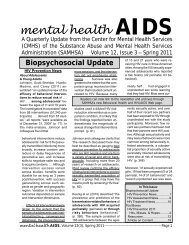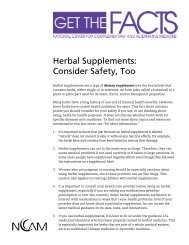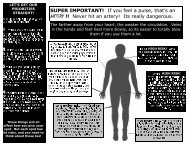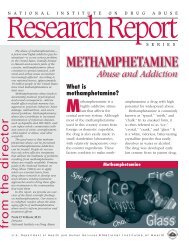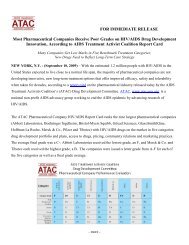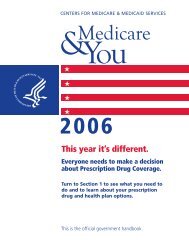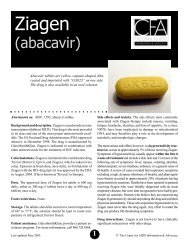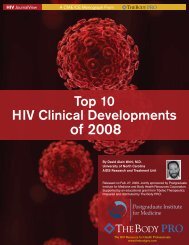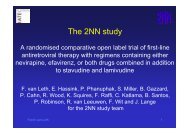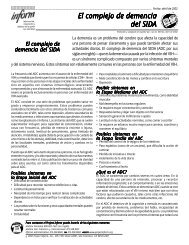The Positive Side (Winter 2013) - CD8 T cells - The Body
The Positive Side (Winter 2013) - CD8 T cells - The Body
The Positive Side (Winter 2013) - CD8 T cells - The Body
You also want an ePaper? Increase the reach of your titles
YUMPU automatically turns print PDFs into web optimized ePapers that Google loves.
ASK THE EXPERTS<br />
Get answers to your treatment questions<br />
Managing Lipid Levels<br />
“My doctor said that my lipid levels are cause for concern.<br />
any do’s and don’ts you can share?” ―JB, Brandon, Manitoba<br />
MAREK SMIEJA<br />
Infectious Diseases Specialist<br />
McMaster University<br />
Hamilton, Ontario<br />
Most experts agree that HIV infection<br />
can cause abnormal lipid levels<br />
and heart disease. We’re also fairly<br />
certain that the main reasons more<br />
people with HIV suffer from heart<br />
disease are smoking, high cholesterol<br />
and some HIV medications that<br />
can affect cholesterol levels.<br />
If someone is a smoker and has<br />
abnormal lipid levels, I first try to<br />
help them quit smoking, or at least<br />
cut back. Next, a dietitian helps them<br />
find ways to lower their bad chol -<br />
esterol and overall risk for heart<br />
disease through diet and regular<br />
exercise. Keep in mind that cholesterol<br />
is just one risk factor of heart<br />
disease. Even if these changes don’t<br />
improve a person’s cholesterol levels,<br />
there are still effective ways to reduce<br />
overall risk of heart disease.<br />
<strong>The</strong> HIV meds known to increase<br />
bad cholesterol and triglycerides<br />
include some protease inhibitors and<br />
some older nukes, such as d4T and<br />
probably AZT and ddI. Every person<br />
starting HIV treatment should have a<br />
blood test to measure their lipid<br />
levels. I give my patients the same test<br />
six months later. If the latter reveals<br />
high bad cholesterol or triglycerides<br />
despite healthy lifestyle choices, we<br />
may change their HIV meds or start<br />
them on cholesterol-lowering drugs.<br />
While seeking to lower cholesterol, I<br />
recommend frequent testing. Once a<br />
person’s level is considered safe, I recommend<br />
that they continue to test<br />
regularly though less frequently—<br />
generally once a year.<br />
26 THE POSITIVE SIDE <strong>Winter</strong> <strong>2013</strong><br />
<strong>The</strong> Lowdown on Lipids<br />
Our bodies contain thousands of different<br />
kinds of fat, known as lipids. When<br />
you have your “cholesterol checked,”<br />
three of these fats are measured:<br />
● hdl cholesterol (high-density<br />
lipoprotein, also known as “good”<br />
cholesterol), which removes bad<br />
cholesterol from the blood<br />
● ldl cholesterol (low-density<br />
lipoprotein, also known as “bad”<br />
cholesterol), which can build up in<br />
the arteries and lead to heart disease<br />
and other health problems<br />
● triglycerides, which can also<br />
increase your risk for heart disease<br />
if levels are too high<br />
Sometimes the body outsmarts our<br />
attempts to reduce cholesterol by producing<br />
extra bad cholesterol, even<br />
when people exercise and are diligent<br />
about their diet. When this happens,<br />
medications from a class of drugs<br />
known as statins can help. Major<br />
studies show that these drugs dramatically<br />
reduce a person’s risk of heart<br />
disease –related death.<br />
Taking both a statin and a protease<br />
inhibitor can produce various side<br />
effects—some minor and some more<br />
serious though rare. In my opinion,<br />
too many people stop their statins<br />
because of minor side effects. It’s<br />
important to remember that suffering<br />
a heart attack or stroke is a serious<br />
consequence of not taking these drugs.<br />
In the same way that millions of<br />
people remain alive because of HIV<br />
drugs, many people are still around<br />
today because of statins.<br />
<strong>The</strong>re’s a lot of interest in natural<br />
treatments. Such approaches can be<br />
somewhat helpful, but changes in lipid<br />
levels generally occur as a result of a<br />
combination of lifestyle changes and<br />
drug therapy.<br />
JAMES SNOWDON<br />
Pharmacist<br />
Snowdon Guardian Pharmacy<br />
Toronto<br />
Treatment of abnormal lipid levels<br />
is integral to improving the heart<br />
health of people living with HIV. It<br />
should start with a healthy diet, exercise,<br />
smoking cessation, managing<br />
hypertension and diabetes. <strong>The</strong>se<br />
are the cornerstone of any treatment<br />
do’s and don’ts.<br />
HIV medication combos frequently<br />
include drugs that elevate cholesterol<br />
and triglyceride levels. One option for<br />
people on HIV treatment is to switch<br />
from the presumed offending agent<br />
to another antiretroviral medication.<br />
<strong>The</strong> recent introduction of more lipidfriendly<br />
drugs within existing classes<br />
(such as the protease inhibitor<br />
darunavir (Prezista) and the nonnukes<br />
etra virine (Intelence) and<br />
rilpivirine (Edur ant)) broaden the<br />
options. In addition, new classes<br />
of drugs (integrase inhibitors such<br />
as raltegravir (Isentress) and<br />
CCR5 inhibitors such as maraviroc<br />
(Celsentri)) offer more options for<br />
people starting therapy and for those<br />
who need to switch drugs.<br />
Lipid-lowering therapies that have<br />
been investigated in people with HIV<br />
include fish oils (see interview with<br />
Cheryl Collier, opposite), statins,<br />
fibrates, ezetimide, niacin and combinations<br />
of these therapies.<br />
statins can significantly reduce bad<br />
cholesterol and triglycerides. Drug in -<br />
teractions between statins and antiretrovirals<br />
are very common. For<br />
example, some protease inhibitors can<br />
raise the concentration of statins and<br />
can lead to statin toxicity. However,<br />
atorvastatin (Lipitor) and pravastatin<br />
(Pravachol) are less likely to interact.<br />
<strong>The</strong> newer rosuvastatin (Crestor) does<br />
not interact with many drugs.<br />
Fibrates are a class of drugs that<br />
can reduce triglycerides significantly






